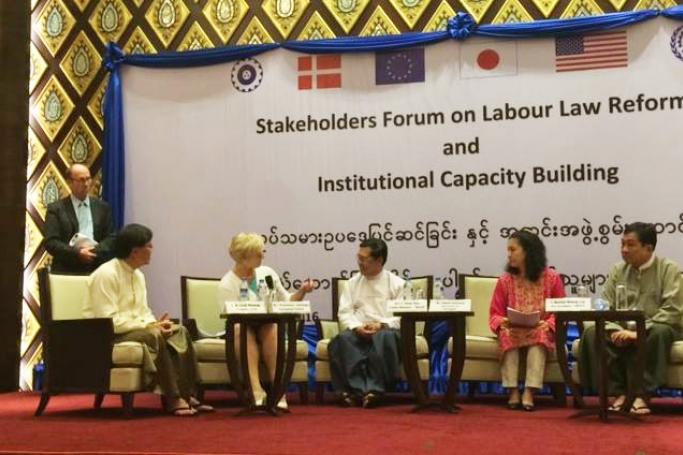Myanmar, Denmark, Japan, the United States of America, the European Union, and the International Labour Organization (ILO) convened the second Stakeholders' Forum of the Initiative to Promote Fundamental Labour Rights and Practices in Myanmar ('the Initiative') on September 29 and 30 in Yangon.
The Stakeholders' Forum provided the opportunity for discussions among Myanmar’s tripartite partners, the other participating international governments, the ILO, development partners, international businesses and investors, as well as other civil society representatives, according to a statement by the European Union delegation in Myanmar issued October 1.
The participants shared views on priorities and challenges for the modernization of Myanmar’s labour laws and practices, and for the improvement of compliance with international labour standards, as well as on how to foster inclusive engagement with domestic and international stakeholders in this process.
The participants welcomed the ongoing progress in adopting labour laws and practices since the last Stakeholders' Forum in May 2015. The most significant developments include:
- Renewed tripartite commitment to labour law reform, including consensus on a phased approach: i.e., phase 1 on amendment of the priority laws; phase 2 on development of a Labour Standards Act; and phase 3 on development of a consolidated and cohesive Labour Code;
- Tripartite agreement that new legislation must be compliant with the fundamental international labour standards, and further that the process should be guided by other relevant international standards recognizing the challenges and capacities of the local environment;
- Tripartite agreement to institutionalize the National Tripartite Dialogue Forum, chaired by the Ministry of Labour, Immigration and Population with employer and worker representation, which will serve as the prime consultation mechanism for the labour law reform process;
- Agreement on the first-ever minimum wage announced on 28 August 2015 following a series of tripartite consultations;
- Development by tripartite constituents in October 2015 of a vision for industrial relations during the first Tripartite Technical Advisory Session on Reforming the Labour Laws in Myanmar in October 2015;
- Enactment of several major legislative amendments, including raising the minimum working age from 13 to 14 years; development of the list of hazardous work for children under 18 years old; and development of an occupational safety and health bill.
Building on contributions by workers, employers, civil society and other stakeholders, the partners reaffirmed their commitment to support the Initiative, including the labour reform plan agreed at the 2015 Forum. They identified priorities for further work on the development of modern and cohesive labour law; institutional capacity building for the labour market actors and institutions, including social partners; minimum wage-fixing institution, and strengthened labour inspection and dispute settlement bodies. Key areas for reforms include enhancing protection of the associated rights of workers and employers organisations, strengthening labour dispute management, reviewing employment contracts, combatting the worst forms of child labour and ensuring occupational safety and health protection.
Participants agreed on the importance of coordinating their activities as well as fostering dialogue among all stakeholders. To support Myanmar's efforts, they agreed to hold a third Stakeholders' Forum in 2017. Development partners committed to provide support to the labour law reform process through development cooperation and technical assistance.
In the medium to long term, the Initiative aims to support public authorities and stakeholders in promoting fundamental labour rights, sound labour relations and responsible business practices in Myanmar. The participating governments and the ILO encouraged all stakeholders to contribute to improving Myanmar's labour market governance. By working together, governments and stakeholders can provide a strong impetus to making Myanmar an attractive and sustainable trade and investment partner and advance Myanmar’s overall sustainable economic development.
One of the representative bodies at the meeting, the European Union, is putting in practice its commitments under the 2015 'Trade for All' strategy to make trade policy more responsible and sustainable and to promote decent work. Together with the government of Myanmar, the EU, as well as the US, Denmark, Japan and the International Labour Organisation, actively participate in the Joint Initiative to Promote Fundamental Labour Rights and Practices in Myanmar.
You are viewing the old site.
Please update your bookmark to https://eng.mizzima.com.
Mizzima Weekly Magazine Issue...
14 December 2023
Spring Revolution Daily News f...
13 December 2023
New UK Burma sanctions welcome...
13 December 2023
Spring Revolution Daily News f...
12 December 2023
Spring Revolution Daily News f...
11 December 2023
Spring Revolution Daily News f...
08 December 2023
Spring Revolution Daily News f...
07 December 2023
Diaspora journalists increasin...
07 December 2023
Exclusive Interview with Bangladesh Ambassador












